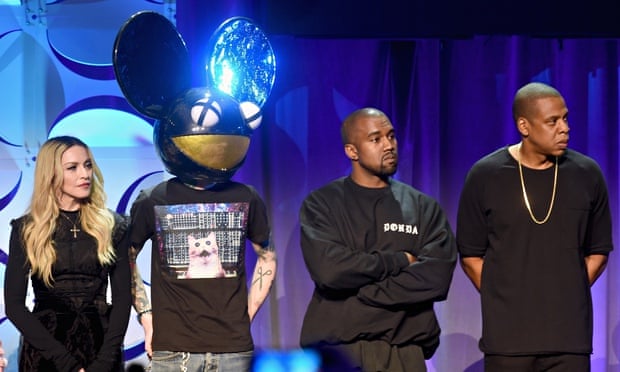 |
| Tense moments at the Top Gear auditions. |
And it's all very lovely, all very impressive, Madonna got to be a briefly erotic granny, there was a lot of talk about paying artists more money than the other services (mostly by charging twice as much for in subscription as everyone else), and given that Mr Carter is somewhat of the entrepreneur it's going to make money. But will it conquer the world? Nope, I really don't think it will, because it's missing out on a couple of key things.
Firstly it's claim of being better for the musicians, by boasting about how much it will pay the artists. This is actually somewhat misleading, as it will pay The Rights Holders more than other services. If you are an artist who owns their recordings then you are going to be doing good, however a lot of people aren't on that great a contract when it comes to streaming so until they get those changed they will mostly be making not that much times two. Don't get me wrong, double is good. But when it's double of almost bugger all once the record label has taken the cash it's not really that awesome, assuming that Tidal can get enough subscribers which it intends to do though sound quality and guilt trips.
The sound quality thing is a curious "and" for me, as it's a kind of pointless exercise on a couple of fronts. If you are streaming at home then the other services product is available at sufficiently high quality as it is that you won't really notice the difference (especially when with high quality content you rapidly reach a point where the speakers rather than the source define a lot of what you hear). If you are streaming on the go then high-quality means lots of data means a service that's going to eat your monthly plan and/or your battery, assuming that you can connect to a solid enough signal to get the stream onto your phone. So you basically have something that you can already get at home via other services or that you are going to have to not use to it's full extent if you are on the go. This is before you reach the question of "can the listener really hear the difference?" which isn't being snobby but repeated experience of no-one I've meet really being able to tell if something is over 300kbps MP3 quality unless they really, really, concentrate very hard. I'm sure someone with a couple thousand pounds of audio equipment in their lounge would be able to tell the difference, but at that point you have to ask 'why haven't they got the CD, as that will always sound better'? And yes, you can download and listen offline, which is now basically the standard anyway and is done at perfectly acceptable quality levels by everyone else). BTW if you think you can tell the difference then take the test.
As the for the guilt trip? Given how much they go on about the artist and the way they "didn't like the direction the music was going" then it's clear that they are trying to attract the "real" music fan, by which they mean 'people who are willing to pay more for their music' and 'anyone who doesn't use those other, cheaper, nasty exploitative services'. Right... because history has proven that the average internet user is always willing to listen to moral arguments when faced with the choice of free-by-piracy or expensive-through-unnecessary-purchase. I can totally get that they are going to try for encouraging the fans, and week long exclusivity contracts, but other services had to keep their costs low for the single reason of the public's unwillingness to pay and I don't think having some of the richest starts in popular music standing in a line to go 'please, we need more cash!' is really going to help things. Maybe if they head a couple of unknowns or not so massive names on there as well it would have been different, but right now it's hardly presenting a radical redistribution of wealth that it's proportioning to be.
So, will it work? Yes, it'll work. There is enough artistic weight behind it and Jay-Z is a great businessman who is brilliant at PR. But I can't see it becoming gigantic, and I certainly can't see it becoming the next Spotify. It will become, gradually, a premium option, something for people who want to show their support or opulence off with. It'll find an audience of it's own and that will grow, but the chances of mass appeal are limited, especially with its key product differential being so mostly pointless and limited by the improvements of various supporting technologies. Still, it gave everyone on stage some nice hype, so it worked out in the end.




